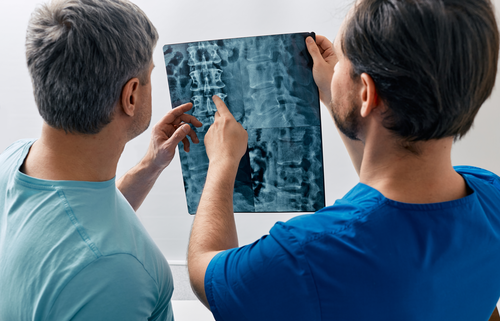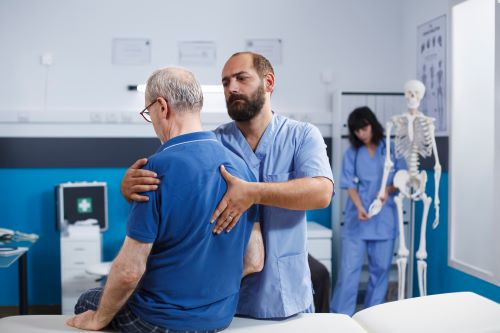The spinal cord is a crucial part of your central nervous system. Suffering from a spinal cord injury can have life-altering effects if severe enough.
At our Marietta spine and orthopedic clinic, we will take care of your spinal cord injury, even if it’s minor. This guide will show you if you may be suffering from a spinal cord injury.
Spinal Cord Injuries
What is a Spinal Cord Injury?
A spinal cord injury (SCI) is damage to the spinal cord caused by trauma (accidents or falls) or medical conditions. It disrupts the communication between the brain and the body.
There are two types of SCI: complete and incomplete. Complete means no sensation or motor function below the injury site, incomplete means some function is retained.
How Spinal Cord Injuries Affect the Body
The body is affected by the location and severity of the damage. Areas below the injury site are affected, which can mean paralysis, loss of sensation and bodily functions.
In complete injuries there is no function below the injury, in incomplete injuries some movement and sensation is retained. Immediate medical attention is key to managing and preventing long term effects of an SCI.
Importance of Immediate Medical Attention
Prompt medical evaluation and treatment is critical after a spinal cord injury. Early treatment can prevent further damage and improve recovery. Delayed medical attention can lead to complications like permanent paralysis, chronic pain and other serious health issues. Recognizing the symptoms and seeking immediate care can make all the difference for people with spinal cord injuries.
How Spinal Cord Injuries Affect the Body
Immediate Effects
The immediate effects of a spinal cord injury are often severe and sudden. Depending on the injury location, there can be sudden loss of movement and sensation below the injury site. This can manifest as paralysis, where you can’t move certain parts of your body.
Pain or intense stinging sensations are common immediately after the injury. Spinal cord injuries can also lead to circulatory control issues, including low blood pressure, known as orthostatic hypotension, and high blood pressure, known as autonomic dysreflexia.
Long term effects
Over time the effects of a spinal cord injury can go beyond initial paralysis or loss of sensation. You may experience ongoing complications like muscle spasticity where muscles contract or jerk involuntarily. Other issues include chronic pain, breathing difficulties and bladder and bowel problems. These long term effects require ongoing medical management and rehabilitation.
Complete vs Incomplete Injuries
The body impact is different between complete and incomplete spinal cord injuries. Complete means total loss of function below the injury site, no sensation or voluntary movement is possible. A complete injury results in a loss of all feeling and control below the injury, while an incomplete injury means that some feeling or movement still exists below the level of the injury.
Incomplete injuries mean some function is retained. This means people with incomplete injuries can still have partial movement or sensation which can impact their rehabilitation and recovery.
Spinal Cord Injury Symptoms
Immediate Symptoms
Immediately after a spinal cord injury several symptoms will show up, the severity of the damage. Loss of movement or paralysis is usually the most obvious, either in the lower part of the body (paraplegia) or all four limbs (quadriplegia).
And there can be complete or partial loss of sensation, so you can’t feel touch, temperature or pain below the injury site. Pain or stinging sensation is another immediate symptom, often described as an intense sharp pain at the injury site.
Delayed Symptoms
Some spinal cord injury symptoms may not show up immediately and can develop over time. Numbness or tingling in extremities can be a sign of delayed symptom onset.
As the body responds to the injury muscle weakness or gradual paralysis can occur. Breathing difficulties, including trouble clearing the lungs or persistent coughing can develop as a delayed symptom, especially in higher up the spine injuries.
Symptoms by Injury Location
Spinal cord injury symptoms vary depending on the injury location. Cervical (neck) injuries can result in quadriplegia and respiratory issues requiring mechanical ventilation. Thoracic (upper back) injuries usually result in paraplegia affecting the legs and lower body.
Lumbar (lower back) and sacral (pelvic) injuries affect the hips and legs, bladder and bowel control and sexual dysfunction. Each injury location has its own challenges and requires specific medical management and rehabilitation strategies.
Associated Conditions and Other Complications
Muscle Spasticity
Muscle spasticity is a common condition with spinal cord injuries. It occurs when nerve signals are disrupted and muscles contract involuntarily. When nerve fibers are disrupted, it leads to involuntary muscle contractions. This can cause uncomfortable and sometimes painful muscle jerking or tightening.
Spasticity is more common in incomplete spinal cord injuries. Treatments for muscle spasticity include medications, Botox injections and nerve ablation techniques to manage and reduce symptoms.
Chronic Pain and Sensory Issues
Chronic pain is a common complication after a spinal cord injury. This pain can be from nerve damage, muscle spasticity or the body’s response to immobility. The brain and spinal cord are part of the central nervous system, which is responsible for processing pain and sensory signals.
Sensory issues like loss of sensation to temperature or touch can also persist and complicate daily activities and reduce quality of life. Effective pain management often requires a multidisciplinary approach, physical therapy, medications and sometimes surgical interventions.
Bladder and Bowel Control Issues
Spinal cord injuries disrupt normal bladder and bowel function resulting in incontinence or retention issues. This can increase the risk of infection and require specialized management like catheterization, medications or surgical procedures.
The spinal column surrounds and protects the spinal cord, and injuries to this area can disrupt bladder and bowel control. Bladder and bowel health is key to preventing further complications and overall well being.
Respiratory Complications
Cervical and upper thoracic spine injuries can significantly impact respiratory function. People may experience breathing difficulties, reduced lung capacity and increased risk of respiratory infections.
These complications require ongoing respiratory therapy and in severe cases mechanical ventilation. Physical and occupational therapists play a crucial role in managing respiratory complications and improving lung function.
Sexual Dysfunction
Sexual dysfunction is another complication of spinal cord injuries. This can include changes in sexual desire, performance and fertility. Counseling, medical treatments and assistive devices can help address these issues and improve intimacy and quality of life for the affected individual.
Occupational therapy can also help individuals with spinal cord injuries address sexual dysfunction and improve their quality of life.
Skin Issues and Infections
Reduced mobility and sensation can cause skin issues like pressure sores or bed sores. These sores occur from prolonged pressure on certain parts of the body resulting to skin breakdown and infection.
Repositioning, specialized bedding and vigilant skin care is key to preventing and managing these complications.
When to Seek Medical Care
Immediate Medical Attention
After any incident that could cause a spinal cord injury, seek medical care even if you don’t have symptoms. Early intervention can prevent further damage and improve outcome.
If you have difficulty breathing, severe pain in the neck or back or visible signs of injury like twisted neck or back, seek emergency medical help now.
Emergency Symptoms
Some symptoms require immediate attention due to their severity and long term impact. These include difficulty walking or balance, numbness, tingling or loss of sensation in the limbs.
Weakness or paralysis in any part of the body or loss of bladder or bowel control are critical signs that requires immediate medical evaluation. Severe pain or pressure in the back, neck or head also requires emergency care.
Timing is Key
The time between a spinal cord injury and medical treatment can impact recovery outcome. Early treatment can minimize the damage, potentially restore some function and prevent complications like chronic pain, infections or further deterioration of the spine and surrounding nerves.
Visit Our Marietta Spine and Orthopedic Clinic Today!
At Georgia Spine and Orthopedics, we understand how debilitating a spinal cord injury can be. Recognizing these symptoms is crucial to making sure your health is prioritized.
Contact us at 678-929-4494 to schedule a consultation with one of our orthopedic surgeons today!






